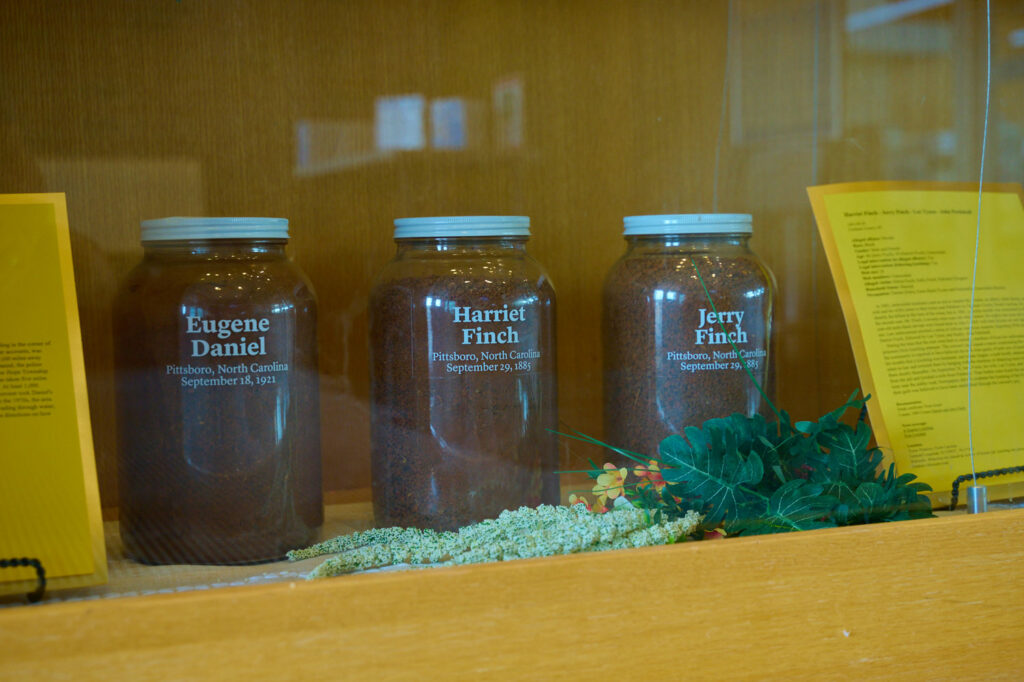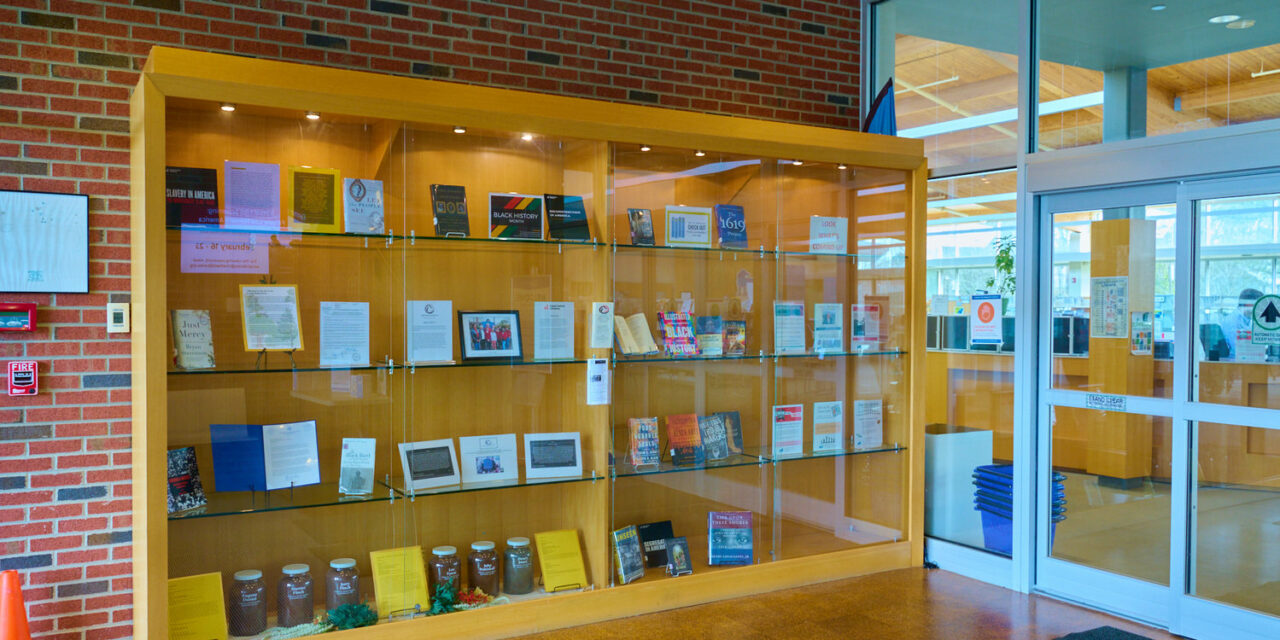![]()
Ben Rappaport, Chatham News + Record
On the middle shelf at the entrance to the Chatham Community Library are biographies about unsung change-makers who defined the civil rights movement — including the first Black Congresswoman, Shirley Chisholm, and local hero George Moses Horton, the Black poet who taught himself to read and write.
On the shelf below is a stark contrast.
There rest jars of soil taken from the sites of Chatham County’s six Black lynching victims — Eugene Daniel, Harriet Finch, Jerry Finch, Henry Jones, John Pattishall and Lee Tyson.
The display at CCL is part of the library’s commemoration of Black History Month and will be on display through the end of February. According to Mary Mills, assistant librarian, the dichotomy of the collection was intentional.
“It’s creating a complete picture,” Mills told the News + Record. “This isn’t just something that happened in books. It happened here, and we all have a connection to it.”
Mills said she wanted to include materials that told stories of Black artists, poets and progress.
Most of the materials in the display, including the soil jars, were provided in collaboration with the Community Remembrance Coalition-Chatham (CRC-C), an organization dedicated to uncovering the county’s history of race relations — the good and the difficult.
Mary Nettles, the CRC-C’s president, said displaying the soil jars and other materials was important because of the ever-changing demographics of the county.
“The county is changing, and the newcomer needs to hear and understand our family story,” Nettles said. “No event or person should ever be dismissed or forgotten. Knowledge and truth can change wrong opinions.”
The soil jars were part of CRC-C’s collaboration with the Montgomery, Alabama-based Equal Justice Initiative, which aims to “provide tangible opportunities to engage and reckon with the legacy of racial terror lynching” through its Community Soil Collection Project.
“We cannot change the pain but we can continue to move toward reconciliation,” Nettles said. “As a county, we can get there by treating everyone fairly.”

Jars of soil from the lynching sites of Eugene Daniel, Harriet Finch and Jerry Finch are displayed in the Chatham Community Library as part of a Black History Month program. They are part of the six total soil collection jars displayed.
While the soil jars are the most eye-catching part of the display, Mills says every piece — including the documents, DVDs and poems — was carefully curated.
“We have a variety of mediums on display including documents from Congress and a recognition by the County Commissioners about the role of local government in the lynchings,” Mills said. “We wanted to include something for everyone to be able to access the topic that resonates with them.”
The display includes artifacts from more than four years of collecting by the CRC-C.Rita Van Duinen, the branch manager of CCL, said the library has a multitude of literature that could have been on display for Black History Month, but she believes it’s important to highlight the progress the county has made since those racial terror lynchings.
“We didn’t want to center only on lynching, even though it is a very real part,” Van Duinen said. “I think the exhibit really hits home the minute you lay your eyes on it. It’s just like, ‘Wow.’”
The books in the exhibit also show the difficulty of reckoning. For example, Van Duinen highlighted “Hanging Tree Guitars” by Freeman Vines. The book tells the story of Vines, an eastern North Carolina artist who takes wood from the trees where known lynchings took place and turns that wood into guitars.
Much like Black history in North Carolina writ large, Van Duinen says the book is “beautiful, haunting and at times strange.”
Along with a variety of mediums, the display at CCL also shows Black history on a variety of scales: local, state and national. Mills said she always tries to ensure her displays include a variety of perspectives.
“It’s a very conscious effort on the staff’s parts when we’re doing these displays to really think about what we’re pulling,” Van Duinen said. “We’re not just pulling materials for the sake of it, but trying to unite them in a theme.”
She said the library’s honoring of Black History Month also extends beyond the entryway bookcase. CCL is using the whole space to display materials, including children’s books that focus on Black leaders and stories with strong Black characters.
The library has also hosted several virtual Black History Month events throughout February including a presentation from Calvin Dark entitled “McMasters’ Will: The Scheme that Almost Freed Us,” which occurred Feb. 9, and a showing of the film “Fannie Lou Hamer’s America” showing from Feb. 16-23.
Van Duinen added that the process of honoring Black history in Chatham County is “ongoing,” extending beyond the month of February.
“We want to make sure that the titles that we select for purchase are inclusive and from diverse populations,” she said. “It’s definitely a conscious effort.”
For more information about CRC-C visit crc-c.org and for more Black History Month programs from CCL visit chathamlibraries.org. The Chatham Community Library in Pittsboro is open Monday through Thursday from 9 a.m. to 8 p.m., Friday from 9 a.m. to 6 p.m., and Saturday from 9 a.m. to 5 p.m. CCL is closed on Sundays.
Chapelboro.com has partnered with the Chatham News + Record in order to bring more Chatham-focused stories to our audience.
The Chatham News + Record is Chatham County’s source for local news and journalism. The Chatham News, established in 1924, and the Chatham Record, founded in 1878, have come together to better serve the Chatham community as the Chatham News + Record. Covering news, business, sports and more, the News + Record is working to strengthen community ties through compelling coverage of life in Chatham County.


